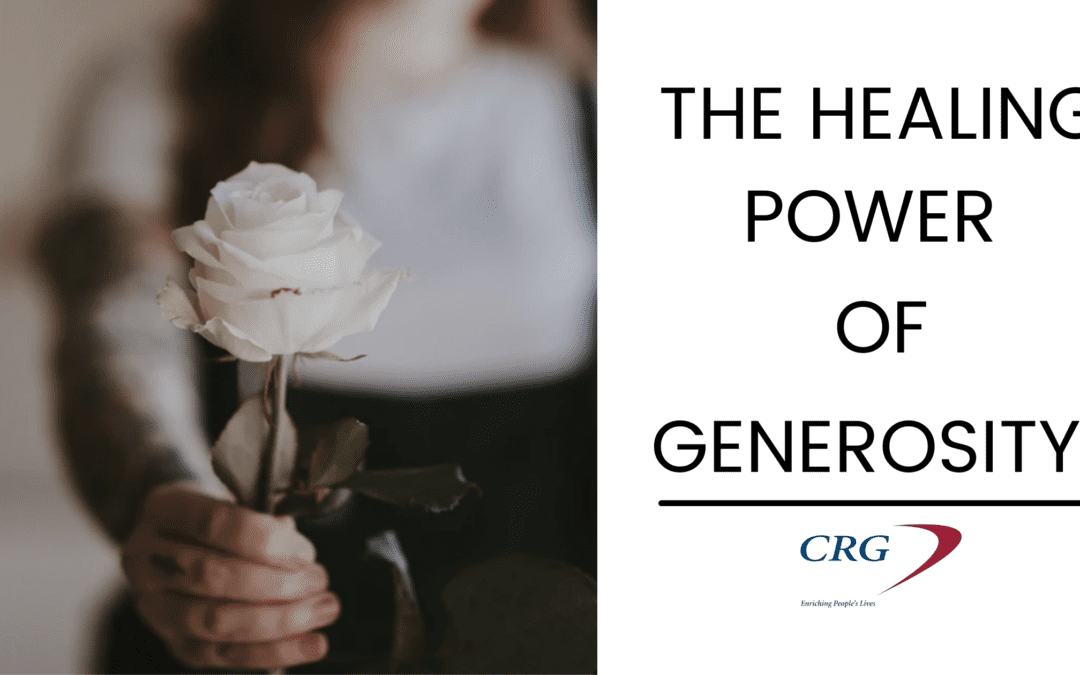The Healing Power of Generosity!
Generous: Characterized by a noble or forbearing spirit; liberal in giving; marked by abundance or ample proportions
The first sign of a society’s decline and even extinction is a shift to self-centeredness. Individuals who are self-absorbed tend to contribute less to society, make less of an impact on other people’s lives; they become destructive in their behaviors, both with themselves and by influencing others.
The opposite is true with those who are generous. Generous individuals are personally more fulfilled, happier, and more peaceful. In fact, as reported in a study by Case Western Reserve University, generous individuals live a longer, healthier life.
So . . . would people who know you well call you generous?
Think about that as you read on.
Research at the University of California verified that generosity begets generosity—in other words, it spreads and transfers and has a pay it forward effect of up to 3 degrees of separation. Your one act of generosity to an individual could reach out and touch someone 3 levels away.
Not only does your generosity spread, it is persistent over time with the person you first impacted. That means your act of generosity toward someone will reach beyond that person; the individual directly affected by your generosity will act more generously toward others for a significant amount of time.
I recall being at a Tim Hortons (coffee and food franchises in North America) drive-through. When I got to the window, I found that the person in the car in front of me had paid for my coffee. At that moment, the anonymous act of generosity made me feel special. I of course passed it on by paying for the order of the car behind me. The staff at the pay window said I was about the 20th car to follow suit after a lady started a random act of generosity that morning.
Even though it cost me the same money to buy someone behind me a coffee, somehow it was more rewarding and felt better to surprise a person with a gift than simply buying a coffee for myself.
In a study conducted at the University of British Columbia, Elizabeth Dunn was able to link people’s spending on themselves and on others to their personal level of happiness. Dunn’s research indicated that giving as little as $5 to study-participants who used the money to purchase gifts for others brought happiness to the givers; a corresponding group of participants who used the $5 for themselves reported no increase in happiness. That supports the old saying Money can’t buy you happiness!
LIVESCIENCE staff writer Jeanna Bryner, reporting on that same research, indicated that Statistical analyses revealed personal spending had no link to a person’s happiness, while spending on others and charity was significantly related to a boost in happiness.
It appears those shopping trips to accumulate more stuff are fruitless in the quest for happiness. Instead of buying something spontaneously for yourself, it’s better to spend that same amount on a gift for someone else or to give the equivalent amount to a charitable cause.
That explains—certainly in North America—why individuals with lots of stuff are no happier—in many cases less so—than those with much less in other countries. If you are hoarding your stuff, you are missing out on one of the critical keys to your happiness—giving and being generous.
There are biochemical linkages to those feelings through the hormone oxytocin. Apparently, the higher your levels of oxytocin, the more generous you will be. The more generous you are, the higher the levels of oxytocin you will produce.
A biblical verse in Acts 20:35 says, It is more blessed (makes one happier) to give than to receive. That has been proven through research into the mental, emotional, and physical benefits of giving.
Now I am not suggesting we should not desire the finer things in life and achieve our dreams but, at the core, we should not go into our quest for the purpose of keeping it all. Contrary to many—like some of the Wall Street executives of the world—the core purpose of our achievements should be as much or more about being able to serve others than to serve ourselves.
Whatever our socio-economic level, we all have something to give. Generosity is not solely about money. Far from it. Generosity applies to our time, our expertise, our friendship, and the other resources we can share.
I learned early in life that generosity is an important family value. My parents grew up in The Great Depression; they knew what it was to have little in terms of material things, but their community was rich in generosity. As new immigrant families to Canada, they survived through a community filled with the spirit of generosity. Through that spirit, barn-raising events began. For example, all the neighbors came together to help build each other’s barns. Usually, if the concrete had been poured previously, the structure was completed in a single day.
My father has never been much for words or compliments, but he has always been very generous. It does not matter what tools I would like to borrow from his well-equipped tool shed, his answer is always Yes. If we ask him or Grandma to pick up the kids at school, they usually say Yes. If research holds true, we are helping them feel better by allowing them to give of their time.
Let me ask again: Would you and others call you generous?
Review the Action Steps below to enhance your happiness by increasing your generosity.
Now Available . . .
Why Aren’t You More Like Me?™ eCourse Discover the Secrets to Understanding Yourself and Others!
⇒ Start your Spirit of Generosity, right here and now.
⇒ Register today—for yourself and for others who could make a difference!
In this course book, Ken outlines CRG’s Holistic Assessment framework and shows why CRG’s multi-theory-designed Personal Style Indicator serves professionals and their clients in a far more effective manner than alternatives such as MBTI, DISC, True Colors, and other single-theory-based assessments.
The feedback has been very positive from participants. They finally understand why they have been frustrated with other assessments and now understand the power of the CRG Personal Style Model.
Don’t wait another minute. Discover the differences for yourself.
⇒ You Can Transform Your Life!
A research study on self-awareness indicates that only 2% of the population will realize their potential without the essential information contained in this eCourse.
Learn to be more intentional with your decisions about
- your career,
- your relationships,
- your personal matters, and
- your professional development.
Everyone will benefit! Register now to this transformational ecourse!

Here’s what Kenneth Blanchard, bestselling author of The One Minute Manager®, has to say.
Ken Keis has written the definitive go-to guide for understanding what makes you—and people around you—tick. Why Aren’t You More Like Me?™ is a fascinating read, because it’s all about you! This book will change the way you think about yourself and your word.
Kenneth Blanchard
Co-author of The One Minute Manager® and Lead with LUV.
Included with your course. . .
- The Online Personal Style Indicator assessment Value: $45.00
- Your own personalized PSI report (20+ pages) about your specific Personal Style pattern and how to increase your effectiveness with self and others
- Five hours of interactive video and exercises.
Why Aren’t You More Like Me?™
Discover the Secrets to Understanding Yourself and Others
ECourse
The Retail price is just $297 (volume discounts available)
This Week’s Action Steps
The Healing Power of Generosity!
- So, are you generous? Why? Why not?
- In what area(s) of your life would you call yourself generous?
- Your money?
- Your resources—lending your stuff to others?
- Your time, to those in need or to the people you love?
- Your expertise or wisdom to those who could benefit and/or the people you can mentor?
- Reflect on the times where you have been generous. How did you feel?
- Think about a time when you could have been generous and you decided not to be. What held you back? In the end, how did you feel?
- Yes, some individuals are scammers and leeches who don’t deserve your generosity, so be conscious and watchful for that type of individual. Unfortunately, a few people will want to take advantage of your generous nature but, no matter what, don’t withhold that important character trait from yourself.
- Now let’s consider the various areas in your life where you could increase or begin your generosity—Money, time, resources, expertise. List a few right now!
- To get you thinking about your list, here are examples of how our family has been generous, personally or professionally.
- Someone needed a van to move, so we helped out with both the van and the guys to load it.
- Help a family member demo their home for new renos.
- Think of someone today that you can encourage to be more generous. Pass on this message! The result of your action will multiply throughout the community. Remember: You all will live healthier and happier lives.
- Clarify your values and style using CRG’s Values Preference Indicator and Personal Style Indicator to help you make values-based decisions so you can be generous with your strengths.
- Complete the Why Aren’t You More Like Me?™ ecourse so you can engage life on your terms, be equipped to help people apply their strengths, and help others realize their potential. Is there a greater gift than that?
- Enjoy the benefits of your own generous spirit along the way—not from a self-centered point of view but from a self-fulfillment perspective. Witness the positive impact your generous spirit has on people’s lives as you pay-it-forward.
- Finally, do it now! This very moment, begin a new level of generosity. Trust me. You’ll immediately feel better.
Until next time, keep Living On Purpose.
Ken Keis

